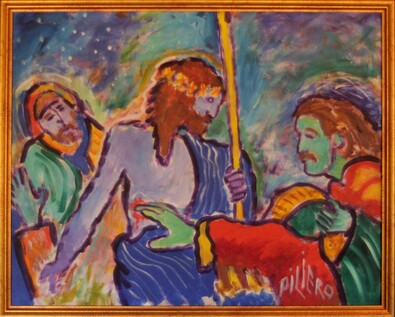
Was Thomas wrong to doubt? He becomes an object lesson for Jesus, but he reminds us that faith is not some abstract idea. The author of Psalm 16 shares his confidence in God all the way through death, not from authoritative right belief, but life experience. Check out the sermon video for the whole story.
Our modern society esteems learning abstractions. We cram it down the throats of students in schools. But our best learning is not from abstractions.
The psalmist in Psalm 16 knows the source of his blessings in their full depth and dimension. He is devoted to his God who he trusts will never abandon him. Even at death, he knows that God will care for him. Nothing abstract in the whole thing.
Somehow Thomas missed out on the visit from resurrected-Jesus. When his mates tell him the story, he refuses to accept it. He wants to check it all out for himself or else he won't believe it.
After a week when I'd imagine Thomas had forgotten about the whole thing, resurrected Jesus returns and he has Thomas particularly in mind. That encounter certainly changes Thomas into a believer.
Jesus teaches from this experience how blessed Thomas is for being able to have this encounter when many coming after him will have to believe without such a visitation.
As the last story in John's Gospel (version 1 anyway; ch. 21 is later added to make ver. 2), the story is meant to speak to those being challenged to live the Kingdom life in the era when the gospel is written, likely at the end of the 1st century, about 4 generations after Jesus crucfixion and resurrection.
But was Thomas wrong? Or did he have a message to which we should pay attention? You decide when you watch the sermon video below.
Our modern society esteems learning abstractions. We cram it down the throats of students in schools. But our best learning is not from abstractions.
The psalmist in Psalm 16 knows the source of his blessings in their full depth and dimension. He is devoted to his God who he trusts will never abandon him. Even at death, he knows that God will care for him. Nothing abstract in the whole thing.
Somehow Thomas missed out on the visit from resurrected-Jesus. When his mates tell him the story, he refuses to accept it. He wants to check it all out for himself or else he won't believe it.
After a week when I'd imagine Thomas had forgotten about the whole thing, resurrected Jesus returns and he has Thomas particularly in mind. That encounter certainly changes Thomas into a believer.
Jesus teaches from this experience how blessed Thomas is for being able to have this encounter when many coming after him will have to believe without such a visitation.
As the last story in John's Gospel (version 1 anyway; ch. 21 is later added to make ver. 2), the story is meant to speak to those being challenged to live the Kingdom life in the era when the gospel is written, likely at the end of the 1st century, about 4 generations after Jesus crucfixion and resurrection.
But was Thomas wrong? Or did he have a message to which we should pay attention? You decide when you watch the sermon video below.
| 04-19-20-ff-answers.pdf |
| 04-19-20-experience_is_believing.pdf |
